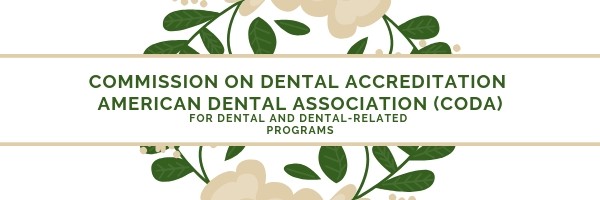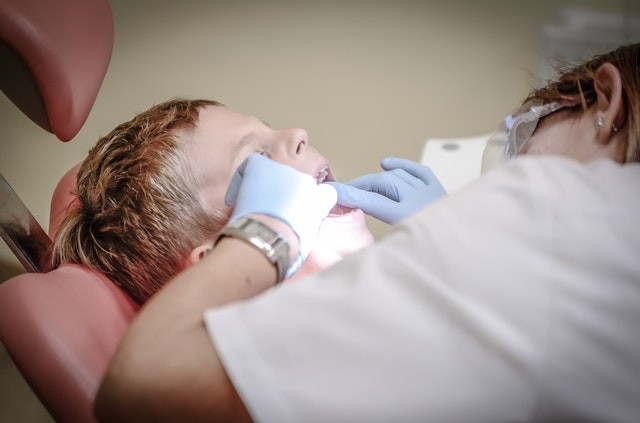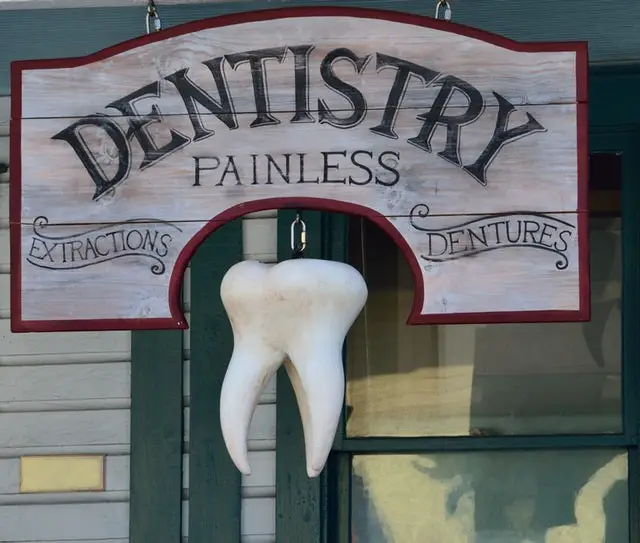Commission on Dental Accreditation American Dental Association (CODA)
CODA is the only dental accreditation association that accredits programs and colleges for offering dental and dental-related education programs which meets the full accreditation standards. Read the blog to know more about the commission.
What is CODA?
CODA stands for Commission on Dental Accreditation American Dental Association. It was established in 1975 and is nationally recognized by the United State Department of Education (USDE) as the sole agency to accredit dental and dental-related education programs offered at the post-secondary level.
The mission of the organization is to serve the oral health care needs of the public through the development and administration of standards that foster continuous quality improvement of dental and dental-related educational programs.
The Commission on Dental Accreditation accredits dental schools and programs including advanced dental education programs and allied dental education programs in the United States.

The commission functions independently and autonomously in matters of developing and approving accreditation standards, making accreditation decisions on educational programs, and developing and approving procedures that are used in the accreditation process.
It accredits more than 1,400 dental education programs.
Dental programs that CODA accredits include the following.
|
Programs/Courses under CODA |
|
| Advanced Education in General Dentistry | Dental Hygiene |
| Advanced General Dentistry Education in Dental Anesthesiology | Dental Therapy |
| Advanced General Dentistry Education in Oral Medicine | Dental Public Health |
| Dental Assisting | Endodontics |
| Dental Laboratory Technology | General Practice Residency |
Mission of CODA
The Commission on Dental Accreditation serves the public and professionals by developing and implementing accreditation standards that promote and monitor the continuous quality and improvement of dental education programs.
Vision of CODA
The Commission on Dental Accreditation is a globally recognized leader for accrediting educational programs in the dental professions.
Core Values of CODA
The values under which CODA operates include the following.
Integrity - The quality of being honest, accountable, and principled.
Collegiality - Working respectfully and collaboratively towards a common purpose.
Transparency - Being open about the process by which accreditation standards and policies are developed and implemented.
Consistency- Fairness, objectivity, and reliability of outcomes.
Eligibility Requirements for Colleges for CODA Accreditation
The eligibility requirements for colleges/universities that CODA accredits include the following.
The program must offer a plainly expressed reason/statement of purpose suitable for dental treatment training, tending to instruct, persistent care, research, and administration.
The dental treatment program must have a responsibility regarding a suitable culture and learning condition that is consistently assessed.
The money must be sufficient to help the program's expressed reason/mission, objectives, and goals.
Programs must be supported by foundations of advanced education.
The supporting establishment must guarantee that help from entities outside of the foundation doesn't affect the instructing and clinical parts of the program.
There must be a dynamic contact component between the program and the dental and allied dental associations.
 source - pexels.com
source - pexels.com
CODA Strategic Plan 2017-2021
The following goals are prepared in the strategic plan.
Goal 1 - The Commission on Dental Accreditation will be a leader in the accreditation of dental education programs by recognizing the emerging areas of dental education, practice, research, and trends in higher education.
Objective 1 - Anticipate and address changes in models of practice and research, and their impact on dental education recognizing the input of diverse constituents.
Objective 2 - Continuously review and identify trends in higher education policy and regulation.
Objective 3 - Identify trends in the scope of practice and monitor the impact on program accreditation.
Objective 4 - Create technological strategies to improve the accreditated program's efficiency and effectiveness.
Objective 5 - Create a comprehensive communication plan to enhance CODA’s visibility.
Goal 2 - The commission will be a leader in the field in the accreditation of dental education programs by ensuring long term sustainability in governance and autonomy, resources, best practices in higher education accreditation, and building relationship, partnerships, and collaboration.
Objective 1 - CODA will realize a greater level of autonomy in its governance and finances.
Objective 2 - It will realize greater autonomy in resource management.
Objective 3 - Build and strengthen relationships by enhanced communication with the organization's communities of interest.
Goal 3 - The commission will establish a global reputation as a leader in dental accreditation by creating and maintaining international alliances.
Objective 1 - Establish and foster relationships with global accreditation bodies and international educational institutions.
Objective 2 - CODA shall continue to develop and expand its scope of accreditation services to international programs.
Objective 3 - It shall consider the accreditation of international sites where educational activity occurs used by CODA-accredited dental programs.
[Also Read: Cheapest Online Colleges ]

source - pexels.com
Colleges and Universities under CODA Accreditation
CODA accreditation provides assurance to students, public and educational institutions regarding the quality and integrity of dental and dental-related programs in that particular college. Some of the colleges and universities accredited by CODA are mentioned below.
Decision Making Bodies of CODA Accreditation
The Commission on Dental Accreditation takes the decisions on matters relating to the accreditation of programs for dental, advanced dental and allied dental education.
The Composition of the Commission on Dental Accreditation includes the following.
| Members of CODA | |
| American Dental Association (ADA) members - 4 members | American Dental Assistants Association (ADAA) - 1 member |
| American Association of Dental Boards (AADB) - 4 members | American Dental Hygienists’ Association (ADHA) - 1 member |
| American Dental Education Association (ADEA) - 4 members | National Association of Dental Laboratories (NADL) - 1 member |
| Postdoctoral General Dentistry - 1 member | Public - 4 members |
| Dental Specialties - 9 members | Student - 1 |
Conclusion
CODA is the only accrediting agency that gives accreditation to colleges/universities that provide programs in dental and dental-related fields.
The institutions have to follow the standards set by the commission to get the accreditation successfully which will help the students to become well-qualified dental professionals.
Frequently Asked Questions
1.What is the difference between ‘accreditation’ and ‘certification’?
Accreditation is an evaluation process where an organization or agency (e.g., the Commission) uses experts in a particular field of interest or discipline (e.g., dental education) to define standards of acceptable operation/performance for universities/programs/organizations and measures compliance with them. Whereas Certification is a process by which an organization (e.g., American Board of Oral and Maxillofacial Surgery) grants recognition of competence to an individual who has met predetermined qualifications specified by that entity.
2.What agency or organization authorizes the Commission to carry out its function?
The Commission has been granted accreditation authority for dental and dental-related education by the United States Department of Education (USDE) since 1952. The USDE conducts reviews for continued recognition at five-year intervals. The Commission was most recently granted re-recognition by the USDE Office of Postsecondary Education in July 2013.
3.What are the responsibilities of the Commissioner?
Members of the Commission make accreditation decisions to award accreditation status and make decisions regarding program's compliance with Accreditation standards. They also consider accreditation policy and financial matters. In general, members of the Commission assume fiduciary or public trust responsibility. Each commissioner is required to - Act in the best interests of the Commission Avoid conflicts of interest and self-dealing Exercise objective, independent, and informed judgment Exercise diligence and participate actively in Commission business Adhere to the Commission’s mission and goals, policies, and procedures Maintain confidentiality about specific accredited programs.
4.Who takes the final action on all policy and accreditation of all programs?
The final decision on all policy and accreditation matters is the responsibility of the Board of Commissioners. The Commission makes these judgments based on its review of the material submitted, the standards themselves, recommendations from its discipline-specific review committees and standing committees and others within the community of interest, and other factual information provided to it.
5.Is any portion of the Commission meeting open to the public?
Yes. Since January 1994, the Commission has opened the policy portion of its meetings to interested observers from the communities of interest. Those attending are observers only and do not participate in the Commission’s discussion. Confidential accreditation matters, i.e., review of individual education programs continue to be discussed in a limited attendance (closed session) portion of the meeting.
6.Are the final accreditation actions made public?
Yes, following each meeting, final accreditation actions are disclosed to all appropriate agencies, including the public. This information is posted on the Commission’s website, is available on request from the Commission office, and is distributed to the broad community of interest via the meeting minutes.
7.Can the public provide comments regarding an accredited program prior to its scheduled site visit?
Yes, according to the Commission’s Policy on Third Party Comments, any interested party such as faculty, students, program administrators, Commission site visitors, dental-related organizations, patients, and/or consumers may submit comments relative to an accredited program prior to its scheduled site visit.
8.How can an individual dentist or member of the public provide input to the Commission?
The Commission routinely seeks written and oral comments from its communities of interest when proposing a change in Commission accreditation standards. A call for comment is sought through a variety of methods, which may include - direct mail, CODA Communicator, electronic notification, and Commission minutes.
9.Can an individual provide comments regarding an accredited program?
Yes, in accord with the Commission’s Policy on Complaints, any interested party may submit a complaint. A formal complaint is defined as a complaint filed in the written (or electronic) form and signed by the complainant. This complaint should outline the specific policy, procedure or standard in question and rationale for the complaint including specific documentation or examples. Complainants who submit complaints verbally will receive direction to submit a formal complaint to the Commission in written, signed form following guidelines in the EOPP manual guidelines. An anonymous comment/complaint is defined as an unsigned comment/complaint submitted to the Commission. Anonymous comments/complaints may be received at any time and will be added to the respective program’s file for evaluation during the program’s next scheduled accreditation site visit. At the time of the site visit, the program and site visit team will be informed of the anonymous comment/complaint. The program will have an opportunity to respond to the anonymous comment/complaint; the response will be considered during the site visit evaluation.